Mlango Farm in Kenya paves the way for new generations of farmers
Mlango Farm in Kenya is an exemplary model of sustainable farming, championed by Els Breet and Kamande Njenga. It combines organic practices, biodiversity, and community inclusivity to pave the way for a new generation of nature-inclusive farmers. By fostering environmental consciousness and providing education to school children, Mlango Farm helps this new generation to create socio-economic impact while tending to the land.
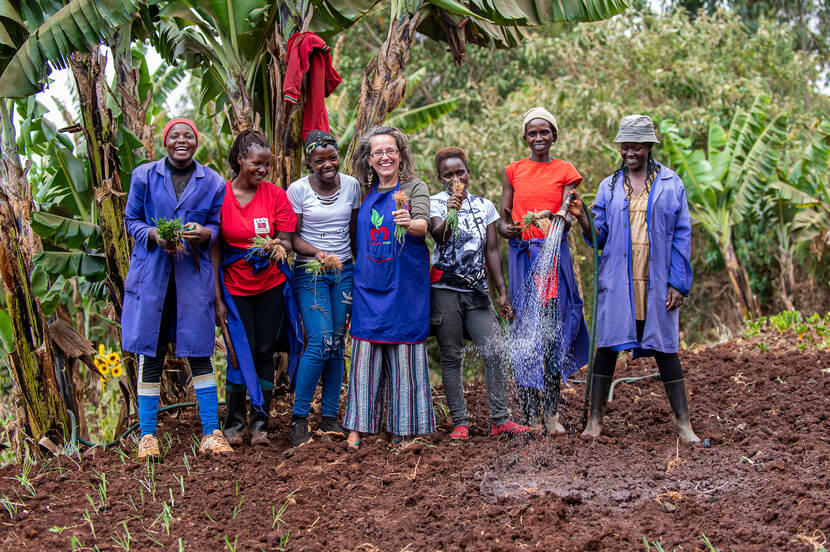
At a 45-minute drive from Kenya’s capital Nairobi sits Limuru town at 2.500m above sea level. At this altitude, the town boasts cool temperatures that range from 10-28°C all year round. Frequent showers regularly refresh the earth and vibrant greenery.
Ngecha village is located within the greater Limuru area. It is home to Mlango Farm, owned and run by Els Breet and Kamande Njenga, a Dutch-Kenyan couple. Kamande met Els in the Netherlands where Els worked at VU University, Institute for Environmental Studies. Together they went to Kenya where they started Mlango Farm in 2007, on a 20-acre piece of virgin land of Kamande’s family.
Mlango Farm in Kenya is an exemplary model of sustainable farming, championed by Els Breet and Kamande Njenga. It combines organic practices, biodiversity, and community inclusivity to pave the way for a new generation of nature-inclusive farmers. By fostering environmental consciousness and providing education to school children, Mlango Farm helps this new generation to create socio-economic impact while tending to the land.
‘Mlango Farm aims to employ women and youth, helping to boost the employment of the local Ngecha community’
Setting the scene for future generations
Back then, Kamande’s goal was to grow his own food, especially vegetables which weren’t readily available in Kenya. Kamande and Els started the farm from scratch, building a sustainable community supported by Els’ family and friends and local people. They leveraged their growth from networks they had built over the years and started hosting lunches for family and friends for lunches.
Their plan was to grow crops organically, with biodiversity and sustainability in mind. In Els’ words: ‘We have borrowed the land from future generations, and we must return it with interest. In this case, the interest will be the richness in soil composition and biodiversity of the land.’
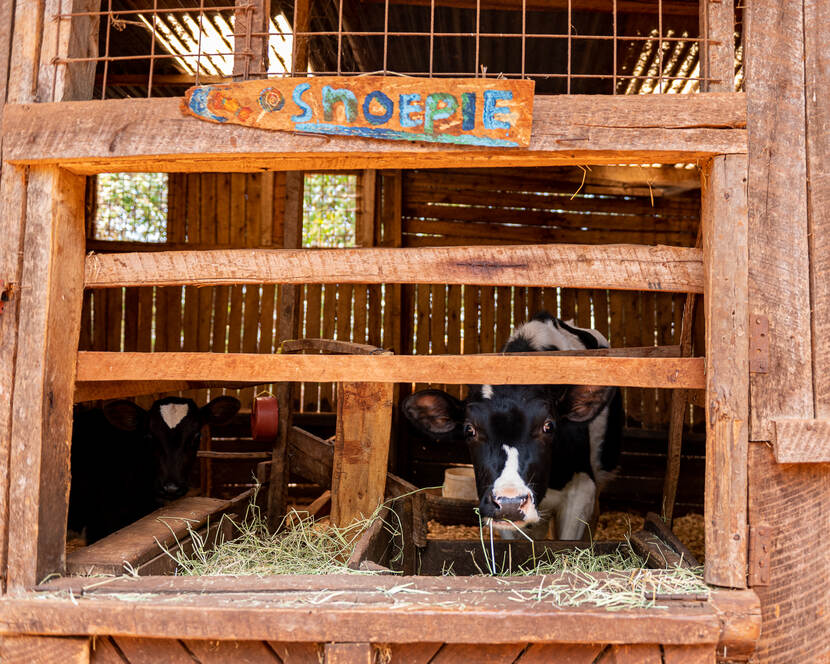
Including trees to reduce sun radiation
Including trees to reduce sun radiation
From the onset, Mlango Farm is no exception to the rolling terrain of Limuru. It is fortunate to have two river streams flowing through, which are located on either end of the land, meaning that it is a steep walk to the farm. There are rows of grevillea, cypress trees, bananas, artemisia and lemon grass bordering the terraces which layer up the farm’s slope. Els: ‘Fifteen years ago, there were just shrubs and a steep slope. We started off by including trees in our landscape, which are great wind breakers. They also help reducing sun radiation when it is hot, while creating shade for the many vegetables we grow. The terraces help in reducing surface water run-off, which leads to maintaining soil moisture for longer.’
‘In addition to this, we are working with La Maison de l’Artemisia, a French organization that promotes the use of Artemisia in the battle against Malaria, especially among vulnerable groups worldwide. Through all these interventions, we can guarantee safety of the food we produce for our clients and a safe working environment for our staff, Els adds.
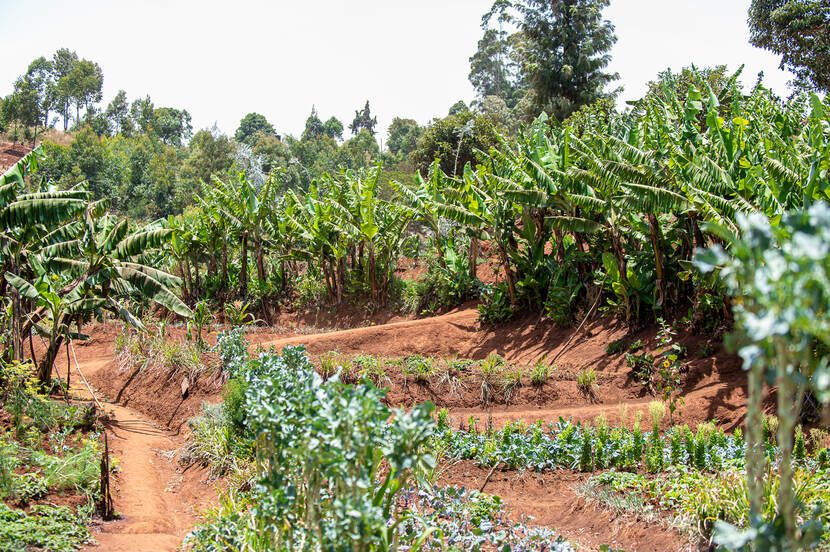
Supporting sustainable farming by reducing pesticides
Els: ‘By including herbs like lemon grass, rosemary among others, we introduced companion cropping, where we noticed that growing some of these herbs act as pest repellants on vegetables, hence reducing the need of using pesticides.’ Further down, a group of ladies are working the vegetable fields, using a shower-style watering method for the crops. Els points out that this is by design and not at all meant to be wasteful. By mimicking rainwater on the crops, it also washes away pests, reducing any need to spray them with any pesticide.
Fifty crop varieties in a veggie cocktail
The diversity of vegetables at Mlango Farm is like a well-blended cocktail, the couple grows over fifty crop varieties. They are intent on avoiding monocropping like many farmers do. Els: ‘If we were to plant just one crop per season, it would be easier for us to manage the farm, but it would reduce the soil nutrition since most monocropped farms use intensive synthetic pesticides, which leads to soil leaching. Through crop rotation, we give the soil a break before we plant the same crop again by planting crops that help improve the soil nutrition. For example, sunflowers and green beans have high Nitrogen, phosphorus and potassium levels that are considered excellent plant nutrient sources.’
‘Many farmers use less labor,’ says Els. ‘But we are happy to employ more local people, especially women and young people. We have employed seventy people from this community. Mlango Farms aims to employ women and youth, helping to boost the employment of the local Ngecha community.
Adapting to climate change
In recent years, Els has noted the effects of climate change at Mlango Farm. The rains are taking longer to fall, temperatures are also rising, which means that the rate of water evaporation from the soil has increased, leading to higher water usage. This ultimately affects the water table, as was the case during the recent drought Kenya experienced.
In response to this, Mlango Farm has developed a fruit orchard, that will become a fruit forest, reducing water usage while creating a micro-climate in the area. The orchard currently has lemon, apples, white sapota, peaches and avocados, among other fruits.
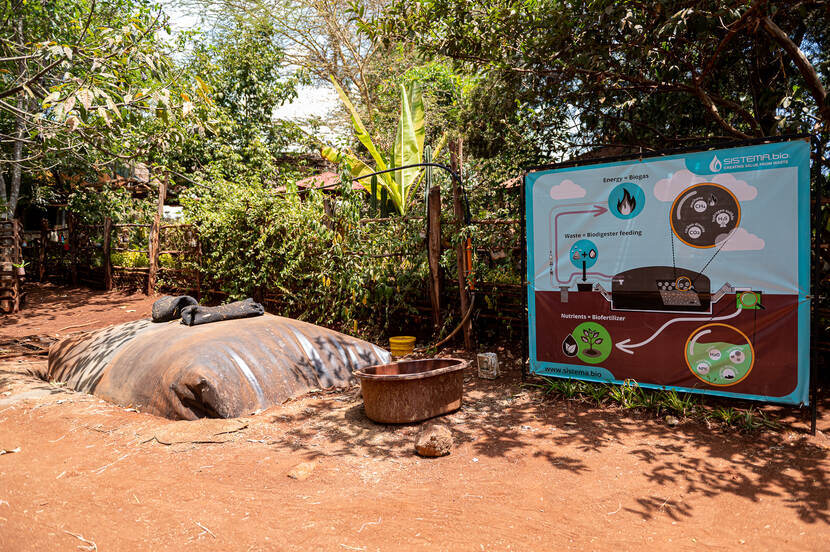
Livestock paving the way towards a sustainable farm
A detour to the livestock area leads to the proverbial animal farm with horses, rabbits, chicken, turkey, goats, ducks, sheep, cows, and the resident donkey. They are not for commercial purposes but a response to the increased demand for organically grown crops, requiring an increased need for organic matter.
This unit has multiple uses that respond to Mlango Farm’s holistic environment; the livestock consumes waste from the farm and produces manure that the farm needs. This manure can be either directly used, composted before application or used as raw material for a recently installed bio-digester at the farm. The goal is to use animal waste to produce gas used for cooking for the staff and guests at the farm, but the slurry is liquid gold, also a great source of bio fertilizer and a biological pesticide due to its high levels of amino acids, growth hormones, and useful bacteria.
This is a perfect example of a circular utilization of waste which is upcycled into useful value-adds which means, improved crop nutrition, lesser farm waste and cheaper cost of power for cooking.
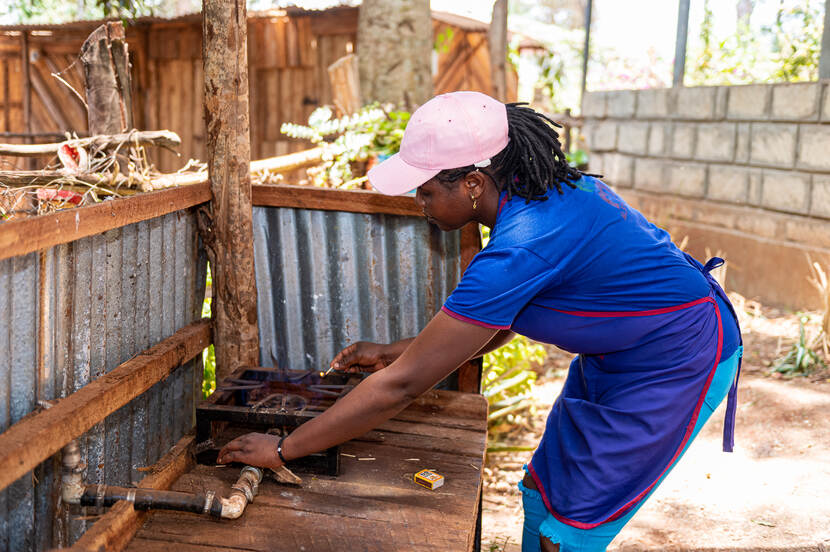
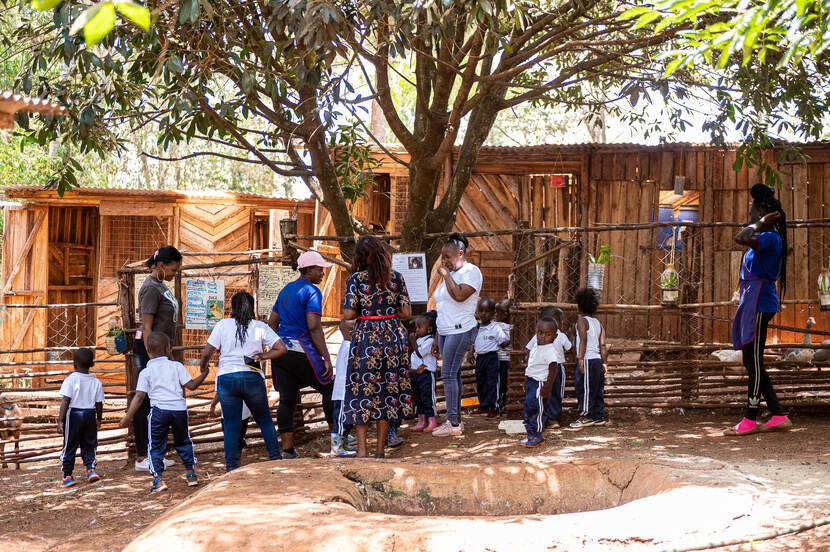
Educating the public
The farm also serves as an education center for schools under the Mlango Farm Foundation. This foundation aims to provide education to every visitor regardless of their socio-economic background or age. It opened its doors in 2014 and has been providing guided tours with lessons on different crop cultivation, livestock and animal care, and waste management. Guests learn about the importance and benefits of creating circular agriculture geared towards reducing, reusing, and recycling organic and inorganic matter from our environment.
It is a special experience for many children because those that live in urban areas do not have regular access to farms and have little knowledge on where their food comes from, hence curating this tour provides hands-on learning for them. On the day of our interview, a group of pupils were at Mlango Farm, learning how to make salads and soups and how to feed rabbits and goats. Els: ‘If we don’t nurture the future generation now, they will think veggies grow in supermarket shelves, where will they turn to? It is our job to pass this baton, maybe even better than it was passed to us.’
Going forward, Els’ and Kamande's vision is to stimulate future farmers who are environmentally conscious and create socio-economic impact sustainably. Mlango Farm is a great example of a sustainable farm, built through organic farming practices, biodiversity, and inclusivity.
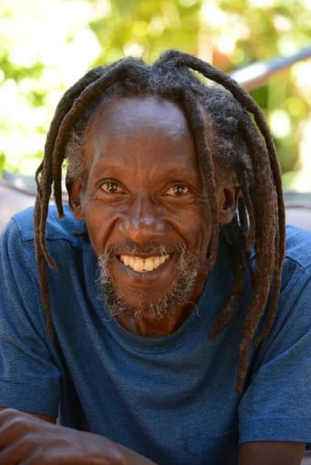
In Memoriam Kamande
After this article was written, Kamande Njenga passed away on 7 May 2023 at Mlango Farm, his family home in Ngecha. His tribute said: ‘Shine on your way, Kamande.’ May your legacy grow.
More information
Email to info@mlango.org.
Useful Links
- Dutch entrepreneurs are investing in organic farming in Kenya
- Brochure: Kenya and the Netherlands working together towards circular agriculture in Kenya
- Regenerative Agriculture for Business in the Veggies for Planet and People Project
- Sustainable and responsible sourcing of fresh produce from Kenya
- Factsheet on water in agriculture
Contact
Would you like to know more about the current developments in the domain of agriculture and nature in Kenya or contact the agricultural team at the Netherlands Embassy in Kenya?
You can visit the country page of Kenya at the website agroberichtenbuitenland.nl of the Netherlands ministry of Agriculture, Nature and Food Quality. You can also send an email to NAI-lnv@minbuza.nl
This article is part of the latest edition of e-magazine Agrospecial (June 2023) about nature-inclusive farming. The teams of our Netherlands Agricultural Network showcase nature-inclusive practices and initiatives in 36 countries worldwide. They delve into the development, benefits and challenges of this innovative farming approach. Each team has a different story to tell. Click here to read more about insights into the potential of nature-inclusive farming practices worldwide!